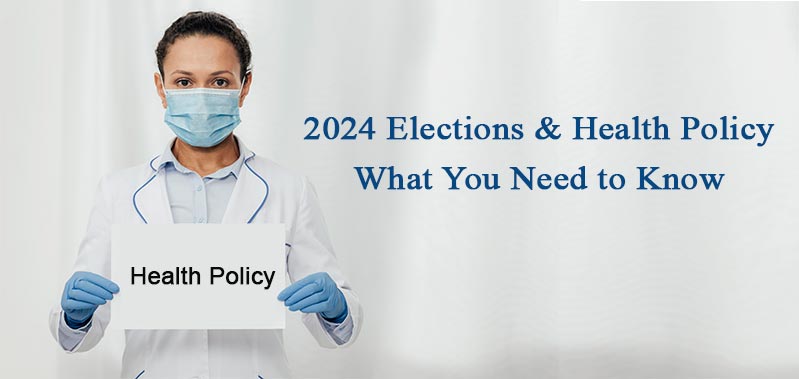
2024 Elections and Health Policy What You Need to Know
Election changes everything from policies to people's lifestyles, and as you know, elections are everywhere in the United States. However, different political parties come up with different agenda and healthcare is one of their top priorities. Healthcare issues are one of the major concerns at both state and federal levels, and they are legislative priorities. Policy governs how the government can modify healthcare financing, delivery, and quality, placing significant influence in the hands of those in power.
Healthcare issues often dominate political campaigns due to their direct impact on voters' lives. Affordability remains a major concern, closely linked with other economic worries. As a significant part of the economy, the healthcare sector sees active involvement from industry stakeholders through lobbying and campaign contributions. However, individual policy positions on healthcare rarely determine election outcomes on their own.
History of Health Reforms By-Election
Health reform, involving major changes in healthcare financing, coverage, and delivery, has long influenced elections. In 1948, Harry Truman's attempt at universal health insurance failed due to strong opposition. However, Lyndon Johnson's establishment of Medicare and Medicaid in 1965 significantly decreased the number of uninsured Americans. Bill Clinton's 1992 campaign also focused on health reform, but his Health Security Act was defeated in Congress, contributing to the Democrats' loss of the House and Senate in 1994 and making the party hesitant to pursue major health reforms for years.
Barack Obama reignited health reform in his 2008 campaign, resulting in the Affordable Care Act (ACA) in 2010, which passed with only Democratic votes. The ACA faced immediate backlash over the individual mandate and false claims of "death panels," aiding Republican gains in the 2010 midterm elections. Despite its controversy, the ACA took full effect in 2014, expanding coverage to millions. Efforts to repeal the ACA became a focal point for Republicans in 2016, but public backlash ultimately preserved the law. This ongoing debate underscores the complexities of balancing reduced federal spending and regulation with coverage and protections for pre-existing conditions.
What Healthcare Changes 2024 Elections Will Bring?
The 2024 elections will bring several changes in the healthcare policy and some of the significant concerns will be:
Abortion and Reproductive Rights
The 2024 U.S. election is expected to significantly impact abortion and reproductive rights, with potential shifts depending on election outcomes. Democrats aim to protect and expand abortion access, possibly codifying Roe v. Wade into federal law. Republicans may seek further restrictions, leveraging recent Supreme Court decisions to tighten state-level regulations. Key battleground states and the composition of Congress will be crucial in determining the extent of these changes, reflecting ongoing national polarization on this issue.
The Affordable Care Act and Medicaid
Medicaid expansion requires a coalition of legislators and advocates at both federal and state levels due to ACA provisions. As of 2024, the most effective approach is state-level action, with the Governor's approval necessary to expand Medicaid to nonelderly people with incomes up to 138% of the federal poverty level. States yet to expand include Alabama, Florida, Georgia, Kansas, Mississippi, Tennessee, Texas, Wisconsin, and Wyoming.
During Trump's presidency, significant changes to the ACA were made, such as repealing the individual mandate penalty and reducing federal funding for consumer assistance. Despite these efforts, insurers' responses strengthened the ACA. Trump has vowed to repeal and replace the ACA, proposing plans that would have drastically cut federal healthcare funding. In contrast, Biden has reinvigorated the ACA, restoring funding and increasing premium subsidies, leading to record enrollments. The future of these subsidies, set to expire at the end of 2025, will depend on the next president.
Rising Prices of Prescription Drugs and Healthcare Services
Trump frequently highlighted high prescription drug costs, criticizing the pharmaceutical industry and pharmacy benefit managers, but achieved little in controlling prices. His administration's insulin copay cap and a rule to tie Medicare drug reimbursements to international prices were blocked by courts. States were allowed to import lower-priced drugs from Canada, continued by Biden, who approved Florida's plan.
Biden's Inflation Reduction Act enables federal negotiation of certain Medicare drug prices, caps insulin co-pays, and limits out-of-pocket costs. Trump's future approach remains unclear, though he previously supported federal price negotiations. Hospital and insurer price transparency remains in place with bipartisan support.
The 2024 elections will significantly impact U.S. healthcare policy, with key issues including abortion rights, Medicaid expansion, and prescription drug prices. Democrats and Republicans have starkly different agendas, influencing legislative priorities and healthcare access. The election's outcome will shape the future of the Affordable Care Act, reproductive rights, and drug pricing regulations, reflecting deep national divisions.





I'm really focused on the upcoming US elections. It's both exciting and worrying because so many changes are possible. This article does a great job covering the major predicted changes. Thanks for the comprehensive overview!